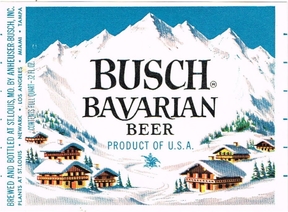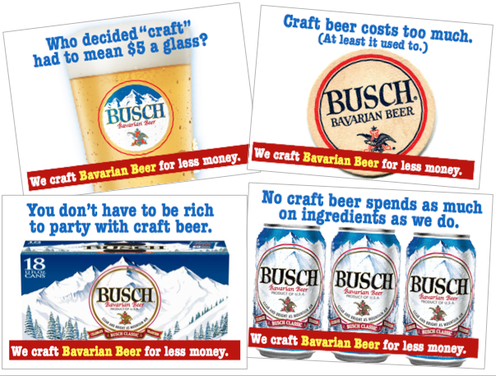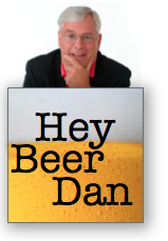Over the past few months, our diligent staff has been trying to solve a little mystery. While we don't collect a lot of data for this site, we couldn't help but notice that we were getting a good deal of folks clicking on an article in our archives, one we had penned over six months back: "Why is Busch beer channeling Homer Simpson?" It lambasted the brand's advertising noting: "'Our beer is for hard-working men (and a token woman)' may be the least differentiating, most generic of beer-brand strategies." Now, it seems those many clicks came from Anheuser-Busch people and ad agency folks involved in yesterday's shakeup announced in the headline article above.
A new ad agency will now try and figure out how to sell Busch beer. This changing-agencies gambit hasn't worked for Bud Light, but perhaps we can help ensure Busch beer doesn't suffer the same sort of failure.
Call us unselfishly helpful.
A novel idea: Begin with a strategy based on distinctiveness
Busch beer competes in the lower-than-premium-priced category. Anheuser-Busch even has a "director of value brands" to look over their many beers that don't command Budweiser pricing. But sadly, the value-brand segment is a very crowded, and largely undifferentiated place. Virtually no brand in this beer-cooler equivalent of a chilly bargain basement has anything distinctive to offer beyond its legacy brand name. Many--Hamm's and Old Style, to name just two--were once vibrant premium brands. Now they've lost advertising support and any distinctiveness they may have once had. Hamm's is just Hamm's... no more ads touting its distinctive land-of-sky-blue-waters home. And no one knows whether Old Style even comes from God's Country anymore.
If Busch beer is to advertise, it needs to uncover a brand insight that delivers real distinctiveness in a provocative fashion. In other words, its ads must actually sell the beer, not merely entertain while hoping in vain anything will result at retail.
 Distinctive... and alliterative
Distinctive... and alliterative Sadly, Busch beer jettisoned its distinctiveness some years back. It lost its one unique descriptor. Concentrating instead on mountain graphics in a me-too effort (never a good idea) to blunt the Coors and Coors Light brands, "Bavarian Beer" disappeared from Busch labels. That happened at about the time the craft beer revolution really picked up steam. Every new craft brand had a story to tell about its distinctive taste, source, ingredients, process... whatever. It is no exaggeration to say the craft beer phenomenon is a triumph of distinctiveness.
So here's the insight: Lower-price-beer drinkers see craft as way too pricey. But what if they could get a taste of a craft-beer style without spending so much? And how would Busch lay claim to that kind of taste experience? By resurrecting its once-distinctive "Bavarian Beer."
Here's how those bits might come together...
How an ad agency would try to kill this idea
As we've noted before, ad agencies too often pursue hipness in ads in an effort to enhance their reputations using their client's money. On top of that, agencies want badly to be seen as the source of remarkable inspiration for their assigned brands, so as to protect their position and their profit. It would be unusual, then, for an agency to spark to a notion that didn't emanate from inside its own walls. When an idea like that--however potentially effective--comes to light, ad people normally aim to find a way to kill it.
In this case, we'd expect the agency might disingenuously call the idea "interesting," but want to "research it a bit." Then they'd cleverly assemble a sample of beer drinkers specifically including too many craft drinkers who, as we said, will whine and guffaw at the notion. The (unsurprising) result will be the death of the idea.
On the other hand, smart client beer people will take good ideas from wherever they come, try to beat them, and if they can't, will run with them. They value sales results over hipness by quite a margin.
Let's hope Busch Beer finds real distinctiveness and a provocative strategy... even if it comes from an old beer guy on the internet.





 RSS Feed
RSS Feed
